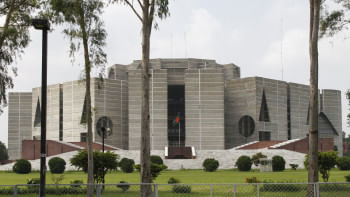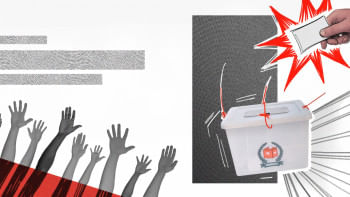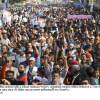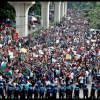Crackdown, groupthink, and the dialogue that didn’t happen

Recently, US Assistant Secretary of State Donald Lu sent letters to all major political parties reiterating the importance of a dialogue. Free, fair and inclusive elections and a dialogue without conditions are the terms on the table. This effort from the US to bring the political parties of Bangladesh to the table may seem strange to the uninitiated. But desperate times call for desperate actions. And the rapidly declining political situation in Bangladesh has resulted in desperate times, indeed.
One of the most deplorable things to have occurred in Bangladeshi politics recently was the violence that took place surrounding BNP's October 28 rally. The day Constable Amirul Parvez was brutally beaten to death on the street was the day all channels of political dialogue died, too. In response, the Awami League government seems to have chosen a path of retribution. Unfortunately, Bangladesh has for quite some time been classified as a "hybrid regime" on the world stage.
In a democracy, the opposition of the government is meant to serve as the voice of the people. In a democracy, laws are meant to be enforced without discrimination. When the police force, internet services, public transport, and many other institutions are clearly being used to target and deprive those who are in opposition to the government, what message does that send to the people? What precedent does it set for political norms in the country?
One can never achieve democracy without dialogue—a fact that the top leaders seem too eager to overlook. They are saying that Awami League will only hold talks with BNP if US President Joe Biden (of the Democratic Party) sits with Donald Trump, the de facto leader of the Republican Party in the US. Perhaps the implication of the comparison was that asking for a dialogue with a party that doesn't have seats in parliament is not a reasonable consideration. However, the point that AL is missing is that it isn't being asked to come to dialogue with just BNP or any other political party. The government is being asked to come to a dialogue with its people. And the people certainly want a free and fair election.
How many of us really believe that the current laws and institutions in Bangladesh lend the capacity to hold free and fair elections? The recent debacle at the Lakshmipur-3 by-election, where a former Chhatra League leader was recorded stuffing the ballot, clearly demonstrates the kind of "election" Bangladesh is used to witnessing. Make no mistake, this kind of ballot stuffing is neither new nor a one-off event—it has been the norm at the sub-national level for a very long time. As per media reports, the person in the video has been expelled by Chhatra League "for breaching party discipline." But why is there no news of his arrest? If there are laws that protect the integrity of the election, why aren't they being exercised to bring this perpetrator to justice? How can those who actively destroy Bangladesh's democracy be let go with a slap on the wrist, while those who protest for democracy are attacked by police? In what world is this situation just or fair?
The practice of democracy in a nation is, in many ways, an issue of decorum. Democracies are run based on unwritten rules and unspoken codes of conduct. In a democracy, the opposition of the government is meant to serve as the voice of the people. In a democracy, laws are meant to be enforced without discrimination. When the police force, internet services, public transport, and many other institutions are clearly being used to target and deprive those who are in opposition to the government, what message does that send to the people? What precedent does it set for political norms in the country?
I do not believe that the people I know and respect in the government want to push our nation towards becoming a one-party state. BNP has historical and contemporary reasons to claim that Awami League follows an authoritarian ideology. Similarly, Awami League has sufficient cause to assume BNP as criminals and terrorists. But what about the people? All those people who attended the BNP rally on October 28—were they all criminals and terrorists, too? Do their voices not matter?
The government had the option to listen to these people. But the top leadership is stuck in a political bubble of its own making. There seems to be no more room for civility or discourse. All opposition are now criminals in the ruling party's eyes. Perhaps the only thing they care about now is holding the election. Perhaps, they think that if they just hold on and conduct the election, all the complexities facing Bangladesh will untangle. Or perhaps they are procrastinating, believing that tomorrow's issues can be handled tomorrow.
In any case, the AL is trying hard to ignore the elephant in the room—the need for a dialogue. The need for a dialogue is a sentiment not only of the wider population, but one that is palpably present among our most important development partners. Ultimately, no one will win if Bangladesh continues to sink into unrest and turmoil. And unless the people's queries and concerns are answered, no win on paper will make up for the goodwill that the government has already lost.
Zillur Rahman is the executive director of the Centre for Governance Studies (CGS) and a television talk show host. His X handle is @zillur.
Views expressed in this article are the author's own.
Follow The Daily Star Opinion on Facebook for the latest opinions, commentaries and analyses by experts and professionals. To contribute your article or letter to The Daily Star Opinion, see our guidelines for submission.

 For all latest news, follow The Daily Star's Google News channel.
For all latest news, follow The Daily Star's Google News channel. 










Comments